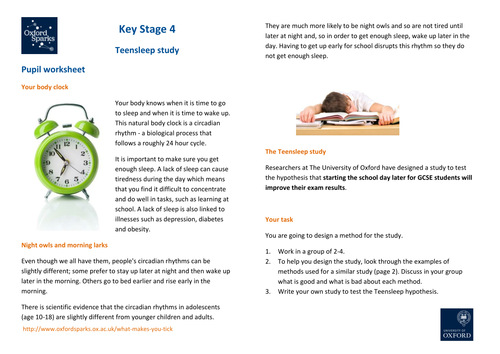




How do you know when it's time to wake up or go to sleep? More powerful than any alarm are your circadian rhythms - natural biological rhythms regulated by exposure to light. A change in circadian rhythms in adolescents means that asking them to wake early in the morning for school results them in being tired and less able to concentrate in lessons. The Teensleep study, conducted by the University of Oxford, is aiming to find out if delaying the school day will help improve the performance of GCSE groups. In this activity, students apply their skills in working scientifically as they design a suitable method for the study.
Learning outcomes:
- Describe what a circadian rhythm is.
- Understand what a randomised control trial is and why they are used.
- Write a method to test a hypothesis.
See more at: http://www.oxfordsparks.ox.ac.uk/what-makes-you-tick.
Learning outcomes:
- Describe what a circadian rhythm is.
- Understand what a randomised control trial is and why they are used.
- Write a method to test a hypothesis.
See more at: http://www.oxfordsparks.ox.ac.uk/what-makes-you-tick.
Something went wrong, please try again later.
This resource hasn't been reviewed yet
To ensure quality for our reviews, only customers who have downloaded this resource can review it
Report this resourceto let us know if it violates our terms and conditions.
Our customer service team will review your report and will be in touch.
£0.00
